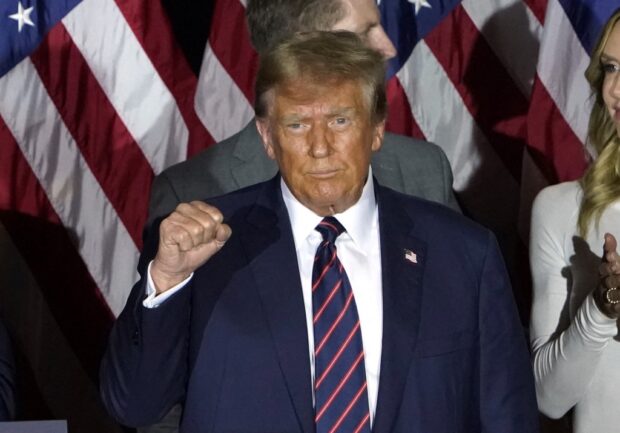Appeals court rejects Trump claim of immunity from prosecution

(FILES) Republican presidential hopeful and former US President Donald Trump gestures during an Election Night Party in Nashua, New Hampshire, on January 23, 2024. Donald Trump is not immune from prosecution as a former president and can face prosecution on charges of trying to overturn the 2020 election, an appeals court ruled February 6, 2024. (Photo by TIMOTHY A. CLARY / AFP)
Washington, United States — Donald Trump has no immunity from prosecution as a former president and can be tried on charges of conspiring to overturn the 2020 election, a federal appeals court said Tuesday in a landmark ruling.
A three-judge panel of the US Court of Appeals for the District of Columbia Circuit said Trump’s claim that he is immune from criminal liability for actions he took while in the White House is “unsupported by precedent, history or the text and structure of the Constitution.”
“Former President Trump’s stance would collapse our system of separated powers by placing the President beyond the reach of all three Branches,” the judges said unanimously. “We cannot accept that the office of the Presidency places its former occupants above the law for all time thereafter.”
READ: Trump says he will pardon many involved in January 6 attack
The ruling is a major legal setback for Trump, 77, the frontrunner for the 2024 Republican presidential nomination and the first ex-president to be criminally indicted, and a spokesman said he plans to file another appeal.
Article continues after this advertisementIn a post on his Truth Social platform, Trump slammed the ruling and said it means “a President will be afraid to act for fear of the opposite Party’s Vicious Retribution after leaving Office.”
Article continues after this advertisement“A President of the United States must have Full Immunity in order to properly function and do what has to be done for the good of our Country,” he said. “A Nation-destroying ruling like this cannot be allowed to stand.”
The appeals court put the immunity ruling on hold until Monday to allow Trump to appeal to the US Supreme Court, which can decide whether to take the case or allow the lower court’s ruling to stand.
Trump had been set to go on trial in Washington on March 4 on charges of conspiring to overturn the results of the 2020 election won by Democrat Joe Biden.
READ: How to trump Donald Trump
But District Judge Tanya Chutkan, who is presiding over the case, was forced to postpone it pending a ruling by the appeals court on the immunity claim, which she had rejected in December.
The three appellate court judges who heard Trump’s appeal last month were unconvinced by his arguments.
“For the purpose of this criminal case, former President Trump has become citizen Trump, with all of the defenses of any other criminal defendant,” they said.
“But any executive immunity that may have protected him while he served as President no longer protects him against this prosecution.”
Special Counsel Jack Smith filed the election conspiracy case against Trump in August and had been pushing hard for the March start date for his trial.
Lawyers for the former president have repeatedly sought to delay the trial until after the November presidential election. Trump could potentially have all of the federal cases against him dropped if he wins the White House again.
‘Pandora’s Box’
Trump also faces 2020 election interference state charges in Georgia and has been federally indicted in Florida for allegedly mishandling classified information.
He was impeached twice by the Democratically controlled House of Representatives while in office — once for inciting an insurrection — but acquitted both times by the Senate.
During arguments last month before the appeals court, Trump’s attorney, John Sauer, claimed that a president can only be prosecuted for actions taken in the White House if first impeached and convicted by Congress.
“To authorize the prosecution of a president for his official acts would open a Pandora’s Box from which this nation may never recover,” Sauer said.
The appeals court judges disagreed.
“Presidential immunity against federal indictment would mean that, as to the President, the Congress could not legislate, the Executive could not prosecute, and the Judiciary could not review,” they wrote.
The Supreme Court is scheduled to hear another critical election-related case this week.
The Colorado Supreme Court barred Trump in December from appearing on the Republican presidential primary ballot in the state because of his role in the January 6, 2021, attack on the US Capitol by his supporters.
Trump appealed the Colorado ruling, and the conservative-majority Supreme Court, which includes three justices appointed by the former president, will hear oral arguments in the case on Thursday.